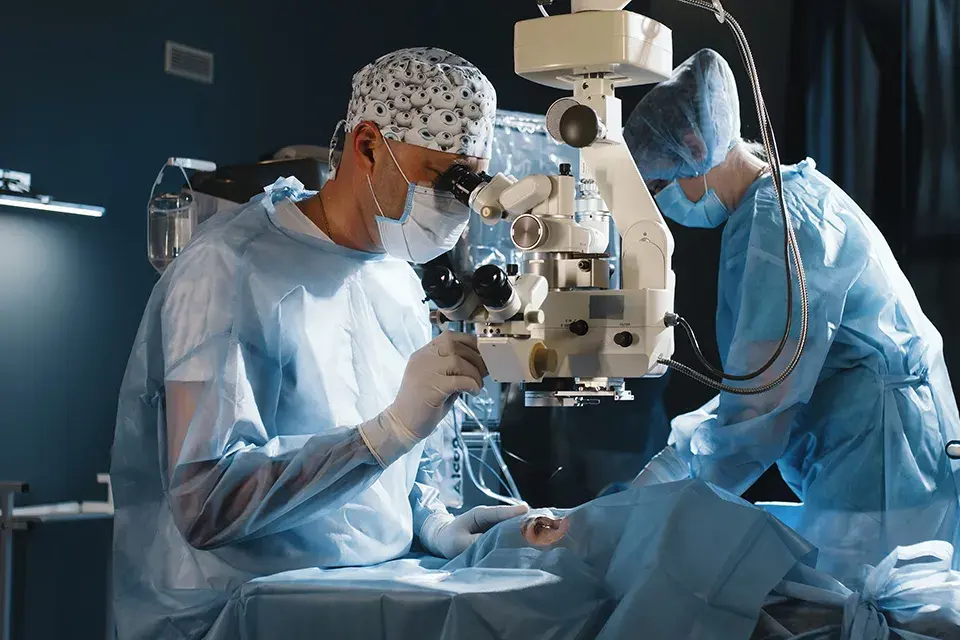Do You Need Cataract Surgery?
Signs, Symptoms, and When to Act
27 Feb 2025
Cataracts are a natural part of ageing, but they don’t have to limit your quality of life. If you’ve noticed changes in your vision, such as blurry or cloudy eyesight, difficulty seeing at night, or trouble reading fine print, you might be experiencing early signs of cataracts. So, how do you know when it’s the right time to consider cataract surgery? In this post, we’ll cover the signs and symptoms of cataracts, when surgery is recommended, and why early intervention is key for preserving your vision.
What Are Cataracts?
A cataract occurs when the lens of your eye, which is normally clear, becomes clouded over time. This cloudiness can affect your vision, causing it to become blurry, dim, or distorted. Cataracts develop slowly and typically affect both eyes, though one may be worse than the other.
As you age, the proteins in your eye’s lens begin to break down, leading to the clouding of the lens. Cataracts are most commonly seen in adults over the age of 60, but they can also occur due to other factors such as trauma, certain medications, or other health conditions.
Common Symptoms of Cataracts
Some common symptoms of cataracts include:
- Blurred vision that worsens over time
- Difficulty seeing at night, especially while driving
- Sensitivity to light and glare from lamps, headlights, or the sun
- Faded colours, with everything appearing yellowed or less vibrant
- Double vision or multiple images in one eye
If you notice any of these symptoms, it’s important to schedule a consultation with an eye care professional to assess the severity and determine whether cataract surgery is needed.

When Is the Right Time for Surgery?
One of the most common misconceptions about cataracts is that you should wait until your vision deteriorates significantly before considering surgery. However, delaying cataract surgery can actually make the procedure more difficult.
In general, cataract surgery is recommended when the cloudiness in your lens is interfering with your ability to perform daily tasks like reading, driving, or working. Waiting too long can also increase the risk of other complications, such as posterior capsule rupture which can lead to reduced vision.
It’s important to discuss your symptoms with your ophthalmologist. They’ll perform a comprehensive eye exam and help you determine whether surgery is the best option. If you’re considering private cataract surgery in Birmingham, you’ll experience shorter wait times and a more personalised approach to your care.
If you’re unsure whether you need surgery or want to explore your options, book a consultation with me today for expert advice tailored to your needs.
How Cataract Surgery Works: A Quick Overview
Cataract surgery is a simple and safe procedure that involves removing the cloudy lens and replacing it with a clear, artificial one. The surgery is typically done on an outpatient basis and takes less than an hour to complete. Here’s what to expect:
- Pre-surgery: An eye exam is done to determine the right type of lens for your eye.
- During surgery: Local anaesthesia is applied to numb your eye, and a tiny incision is made to remove the cloudy lens. The new lens is then inserted.
- Post-surgery: After a short recovery period, you’ll be able to go home the same day. Most patients report significant improvement in vision within a day or two.
To learn more about what’s involved in cataract surgery, feel free to visit my cataract surgery information page.

Private vs NHS Cataract Surgery: What’s the Difference?
While cataract surgery is available through the NHS, many patients choose to go private for a variety of reasons, including:
- Shorter wait times: NHS cataract surgery can take several months, while private patients can usually get an appointment within weeks.
- Personalised care: Private surgery often provides a more tailored experience with additional time for pre-operative consultations.
- Choice of lenses: Private surgery gives you access to advanced lens options like multifocal IOLs, extended depth of focus (EDOF) IOLs, or toric lenses, which can reduce your dependence on glasses after surgery.
When deciding between NHS or private cataract surgery, consider the level of personalised care and continuity with your clinician that you are after, as well as access to the latest lens technologies
How to Choose the Right Cataract Surgeon in Birmingham
Selecting the best surgeon for you is a crucial part of your decision-making process. Here are some tailored tips to help you choose a qualified cataract surgeon:
- Credentials & Affiliations: In addition to standard certifications, check for affiliations with professional societies such as the UK & Ireland Society of Cataract & Refractive Surgeons (UKISCRS) and the European Society of Cataract & Refractive Surgeons (ESCRS). These memberships indicate that the surgeon is actively engaged with the latest advancements in the field.
- Surgical Volume & Outcome Data: While “experience” can be hard to gauge, ask about the number of cataract surgeries performed annually and request information on success rates and patient outcomes. A surgeon who consistently performs a high volume of procedures is likely well-practiced, and published outcome statistics can provide additional reassurance.
- Personalised Consultation & Communication: Choose a surgeon who takes the time to listen to your vision goals and explains the benefits and trade-offs of different lens options. Clear, personalised communication is key to ensuring you understand your treatment plan and feel confident in the decisions made.
- Patient Testimonials & Detailed Reviews: Beyond generic ratings, seek out detailed patient reviews and success stories that describe the overall experience—from the initial consultation to post-operative care. Real-world feedback provides insight into the surgeon’s reliability and the quality of patient support you can expect.
If you’re looking for a highly qualified cataract surgeon in Birmingham who meets these criteria, you can book a consultation with me to discuss your options and find the best solution for your vision needs.
Next Steps: Booking a Consultation for Cataract Surgery
If you’ve experienced any of the symptoms of cataracts and are considering surgery, the next step is to book a consultation. During your appointment, we’ll discuss your symptoms, evaluate your eye health, and explore the different lens options to find the best fit for your lifestyle.
Feel free to book a consultation today to take the next step in improving your vision and reclaiming your quality of life.

